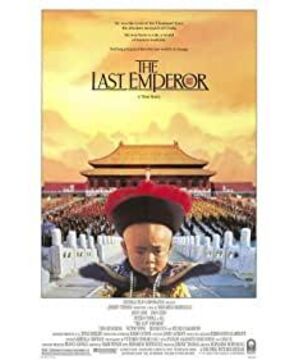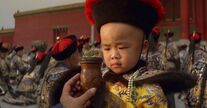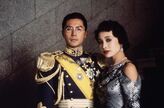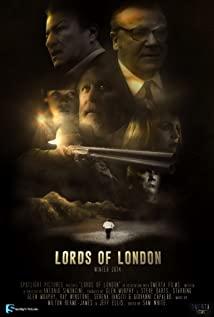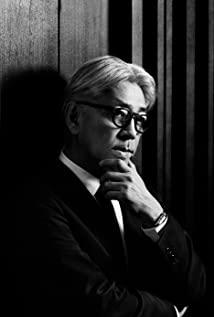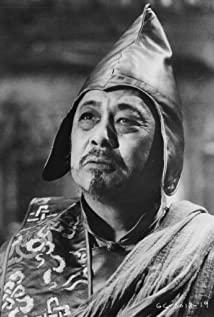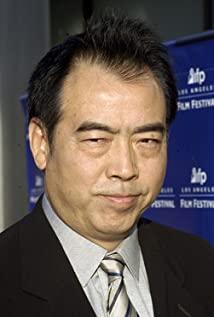It specifically refers to the rebirth of a person to a role, acting like what.
Actually I don't agree.
Because no matter how good it is, it is just a word like "like".
The pinnacle of acting should be "acting what is what."
Can't see the acting, just that character.
Many years ago, when I watched Zhang Yimou's "Alive", I was impressed by the Fugui portrayed by Ge You.
Comment after watching: Ge You is the best actor in Mainland China.
In the following years, after the baptism of the acting skills of major actors, this title has been occupied by him.
Until I watched "The Last Emperor".
I believe this movie should be heard by everyone, but it belongs to the list that very few people have seen.
Due to its long history and the sensitive content in the plot, domestic theaters have no chance to see it.
But the Oscar for Best Picture, the only filming crew in the Hall of Supreme Harmony, and even Ryuichi Sakamoto's classic soundtrack are the focal points of the movie's fame.
However, no matter how famous the honor is, it can't cover the protagonist of this movie:
Zunlong's shaping of Puyi.
If I had to describe it in one word, it would be: astonishing.
Before we admire his acting skills, let's take a look at the life of Puyi, the protagonist of the film.
Puyi, surnamed Aixinjueluo, courtesy name Haoran, was the son of Prince Chun Zaifeng.
At the age of 3, he was established as the heir emperor and granted Zaifeng as the regent, and the era name was "Xuantong".
At the age of 6, Puyi, who had been on the throne for less than 3 years, abdicated and lived in the palace.
At the age of 11, Puyi accepted Zhang Xun's petition to restore the monarchy, but only became emperor for 12 days.
At the age of 18, Feng Yuxiang and others launched a coup in Beijing, and Puyi fled to the Japanese embassy.
At the age of 26, under the planning of the Japanese invaders, he became the puppet "Manchukuo" in power.
In 1945, when Japan surrendered unconditionally, Puyi, 39, was captured by the Soviet army on the way to Japan and taken to Siberia, where he was detained in a concentration camp for five years.
In August 1950, Puyi and other pseudo-Manchukuo war criminals were handed over by the Soviet government to the Chinese government, where they were detained in Harbin and Fushun for 10 years.
He was released by the Supreme People's Court under an amnesty order in 1959, when he was 53 years old.
His life, from emperor to criminal to commoner, has many ups and downs.
What is presented in the movie is the past of this last emperor.
As a historical story, this film does not focus on the major events in the late Qing Dynasty, but focuses on the fate of those characters who are swaying in the turbulent situation.
Fortunately, the director's treatment allowed us to see Zunlong's seamless shaping of Puyi.
At the beginning of the film, it was Puyi who was sent back to China, a war criminal who got off the train.
The prisoners who came with were all wearing thick military caps, and he was out of place in the crowd with his jazz hat.
He looked at the land he once ruled, with a bit of disgust in the strangeness.
He didn't want to come back.
The country changed hands and the empire changed.
He became an antique victim.
In the waiting room, he thought of suicide.
Zunlong cut his wrist with force, and his body trembled.
It is said that suicide by cutting the wrist can be done with a single knife as long as you find the right place.
He scratched the blade hard, as if making a silent indictment of the world.
The blood flowed down his wrist, staining the pool red, and the people outside shouted violently, "Open the door, open the door."
At this time, Zunlong's expression changed from unwilling to relaxed, and even a little happy.
He is a passive person, and only in this urgency can he soberly realize that he wants to be liberated.
However, no.
He is also a person who is imprisoned by the past and by the memories.
It is said that when a person is on the verge of death, the major events of his life will be reproduced like a movie.
At this time, Zunlong frowned slightly, his eyes flickered, and there was a trace of childlike simplicity in his urgency.
He thought about the night that changed his life.
The emperor was critically ill, and Puyi, who was only three years old, was taken away from his mother by the guards.
Started his life precariously.
The film uses the method of interspersed reality and memory, and every switch is just right.
After Guangxu's "death", Puyi was designated by Cixi as the heir to the throne. Just after reading the edict, Cixi died.
At the age of three, he was taken to the throne by the ministers and eunuchs.
At the enthronement ceremony, he ran unrestrained in the Forbidden City, and was attracted by a cricket cricket in joy.
As everyone knows, the cricket in the cage is the true portrayal of him later.
Now, from a king of a country, to a prisoner.
He begged to die.
After being rescued, he asked, why not let me die.
The jailer said that he would live until the day of judgment.
He said helplessly, you will kill me as well.
There was an imperceptible wry smile in his demeanor.
He didn't want to die.
I had to choose this way.
However, his life is too important.
He also clearly knew this.
For an emperor wandering in troubled times, it was his sobriety that brought him endless pain.
Now, living is his torture.
Puyi, who was in prison, was shaped to the extreme by Zunlong, especially when he was just living in prison.
When he was examined, he saw Xiao Li, a former attendant.
Xiao Lizi stood in the crowd and wanted to call the emperor, but Puyi turned around tremblingly, wanting to call the old man but unable to call out his expression, which made people sad.
Perhaps it was a deliberate arrangement by the prison. In Puyi's room, two old friends lived.
His older brother Pu Jie and Xiao Lizi.
When Pu Jie saw him, he was excited to hold his brother's hands.
During the five years in the concentration camp, Pu Yi's hands must have become rough, and Pu Jie looked at his younger brother distressed.
The two brothers sat down without any words, just pulled each other's arms.
The past, flashed by scene after scene.
No one thought that goodbye would be here with such a face.
The actions and demeanor of the two are completely the epitome of the loneliness of an era.
In fact, acting is a relatively abstract concept, which cannot be summarized in one-sided language.
If it can be quantified, I think it is the degree of audience participation.
And this "The Last Emperor", I was deeply involved in the play.
Three and a half hours of film, I watched it twice.
Anyone who loves watching movies knows that once the viewing is not smooth, it will greatly affect the viewing experience.
But the second time I watched it again, as long as I saw Zunlong's face, I could immediately enter the play and go back to Puyi's time.
At that time, he was married and in charge, but his fate did not change.
On the contrary, because of this maturity, he carried too many burdens.
He wanted to liquidate the stolen antiques from the Forbidden City, but the eunuch burned the ledger.
For an emperor to do this, it can be said to be extremely pitiful.
He is a man of ideals who wants to build his own empire.
Although, no one asked what he wanted, and no one cared.
For the throne, when he was young, he just sat in the Golden Palace and was admired by thousands of people.
The empire, however, became the mission he defended in troubled times as an adult.
He has no choice.
The mountains and rivers are broken by the wind, and the life experience is ups and downs.
He doesn't want to be an ordinary person. In his identity, he has always been the emperor of the Qing Dynasty.
Even in prison, he retained the air of a regal.
As for the allegations during the interrogation, he knew their tactics too well.
Although the majesty of the emperor of the past is no longer there, the backbone of the royal family still exists.
He recounted his past according to his memories, and he did not let go of the past when he became a prisoner.
Every memory affects my nerves, and it affects my emotions at this time.
During the Puppet Manchukuo period, there was another ups and downs.
He came here with his last fantasies, but was deceived by the Japanese.
Everyday life is to drink and dance, the women around me take drugs, and those who leave leave.
He was the only one left, a loner in a foreign land acting like a marionette.
However, none of the current interrogators believed him.
Yes, they still thought he could control fate.
His emperor body, but moved from one cage to another cage.
The emperor's dream that was doomed from birth was still locked on his feet.
The prison in the northeast is very cold, and Xiao Li, who has been taking care of him, is gone.
There, he learned to dress himself, wash the toilet, play Tai Chi, and grow flowers...
He was served for decades, and he knew nothing. From the sky to the ground, no one taught him.
Seeing him skillfully loosening the soil and watering the flowers, I never believed that this was the young man who once sat on the dragon carriage.
But, it was him.
A look is a life.
A back is an era.
The actor's temperament hides the character he creates.
Looking back at Puyi's life, the characters created by Zunlong fit this resume perfectly. I think this is the highest level of acting skills.
I saw that era in his renditions.
He is also Puyi in my eyes.
At the end of the film, Puyi bought tickets for the Forbidden City and came to the Hall of Supreme Harmony alone.
The son of the palace administrator saw him and forbade him from entering the main hall.
He staggered to the dragon chair he once sat on, took out his hidden cricket from the back, and carefully wiped the dust off it.
The little boy gently lifted the lid, and there were still crickets crawling out of it.
"Hey chirp", "chirp chirp"...I
don't know how many times the human affairs in the world have been changed.
View more about The Last Emperor reviews


